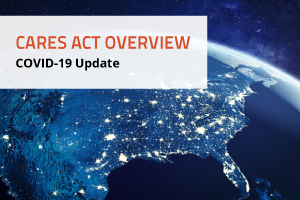The CARES Act Provides Sweeping Relief to Taxpayers
 After much debate in Congress, the Coronavirus Aid, Relief and Economic Security (CARES) Act was signed by President Donald Trump on March 27, 2020. It is the latest in a series of aid and relief packages to assist Americans as the nation struggles with the ongoing COVID-19 pandemic. This law represents the single largest domestic relief package ever passed by Congress and provides much-needed aid both to individual taxpayers and businesses.
After much debate in Congress, the Coronavirus Aid, Relief and Economic Security (CARES) Act was signed by President Donald Trump on March 27, 2020. It is the latest in a series of aid and relief packages to assist Americans as the nation struggles with the ongoing COVID-19 pandemic. This law represents the single largest domestic relief package ever passed by Congress and provides much-needed aid both to individual taxpayers and businesses.
The CARES Act: Tax Relief for Individuals
The CARES Act contains the following relief provisions for individuals:
- An immediate and retroactive refundable tax credit will be paid to all American tax filers as rapidly as possible, up to $1,200 per individual ($2,400 for a joint return) and $500 for each qualifying child. Simply put, economic stimulus payments will be sent to Americans who filed a tax return for 2018 or 2019. This payment is reduced if the taxpayer’s adjusted gross income (AGI) is greater than $75,000 ($150,000 for a joint return).
- The 10% early withdrawal penalty for distributions of coronavirus-related expenses (up to $100,000) is waived. The taxpayer still recognizes income from such a withdrawal, but the penalty does not apply.
- The required minimum distribution (RMD) rules for retirement plans are waived for the 2020 calendar year.
- A new, above-the-line deduction of up to $300 of qualified charitable contributions has been made available for tax year 2020 for taxpayers who choose not to itemize their deductions.
- The AGI limitation on the charitable contribution deduction for those who choose to itemize deductions has been removed.
The CARES Act: Tax Relief for Businesses
The CARES Act contains the following relief provisions for business entities:
- Employers are eligible for a payroll tax credit of up to 50% on wages paid up to $10,000 during the crisis period, as a way to incentivize employers to keep workers on the payroll. This credit is available for firms that retain employees who cannot work due to business slowdown or closure during the crisis.
- Employers may defer the payment of the Social Security portion of payroll taxes. Half of the deferred amount will be due by December 31, 2021, and the other half of the deferred amount will be due by December 31, 2022.
- The limit on charitable contributions by corporations has been increased. The previous limit of 10% of taxable income has been increased to 25%.
- The provisions regarding net operating loss (NOL) have been changed. Net operating losses sustained by entities in tax years 2018, 2019, and 2020 may now be carried back up to five years to offset taxable income (the taxpayer may elect to forgo this carryback). The 80% limitation of taxable income that may be offset by NOLs has been removed.
- The limitation on the deduction of interest for certain entities has been increased. Under previous law, certain businesses could only deduct interest expense up to 30% of adjusted taxable income (EBITDA, roughly speaking). For tax years 2019 and 2020, the limit has been increased to 50% of adjusted taxable income.
- The CARES Act makes a long-awaited technical correction to the Tax Cuts and Jobs Act of 2017 regarding the treatment of qualified improvement property (QIP), which are certain improvements to the interior of nonresidential property. Such property has been given a 15-year tax life for depreciation and is now eligible for additional first-year (“bonus”) depreciation when placed in service.
The CARES Act also introduced a $350 Billion Forgivable Loan program to inject capital into small businesses needing relief. The Paychecks Protection Program will be administered through the U.S. Small Business Administration Program (SBA) 7(a) program. A unique feature of the program is that the loans can be partially or fully forgivable.
We are currently looking at the provision of the CARES Act and will be reporting the main details here shortly.
We understand that during these times there can be information overload, especially when the world is changing around us on a seemingly daily basis. MRPR stands ready to help you with tax planning, tax filing and obtaining sources of capital or financing.
Topics: Tax Topics, COVID-19 Updates



